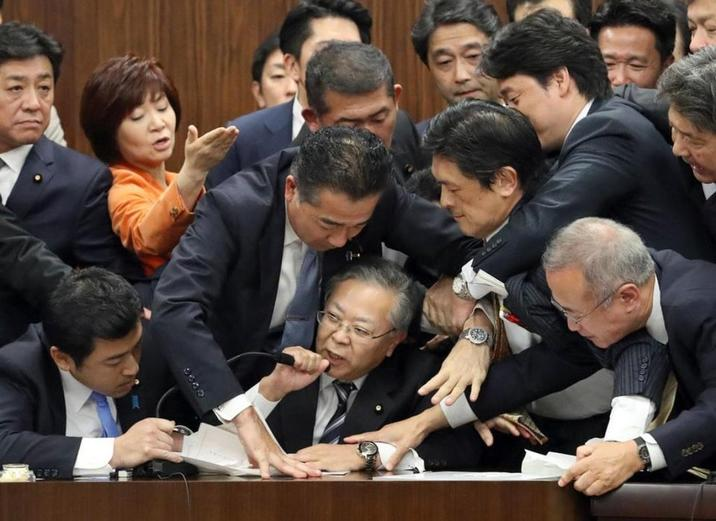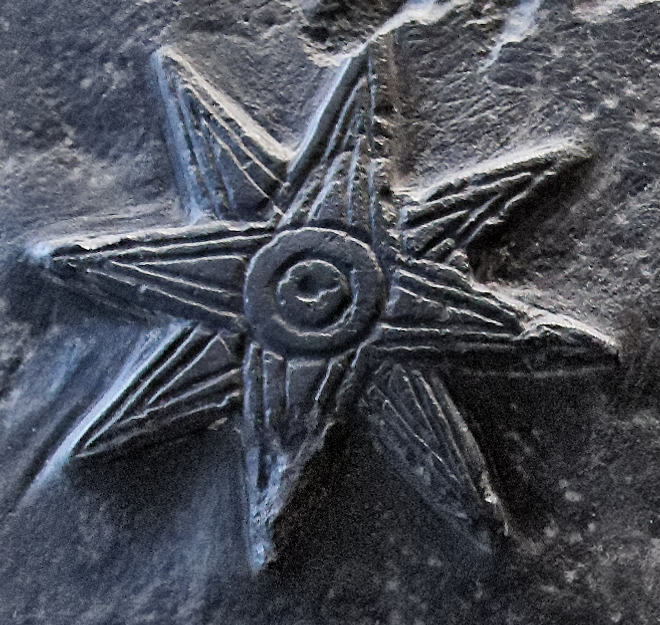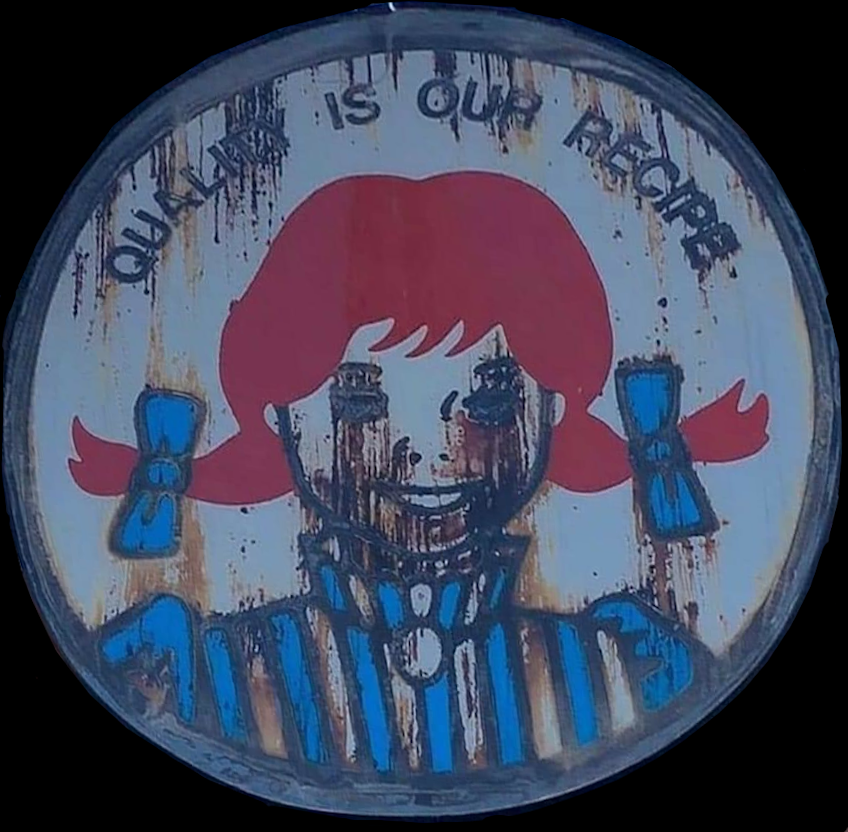I was asked for a source on this today. I couldn't find this on hexbear anywhere and other places that do have it have been slowly disappearing or becoming harder to find over time. So I thought I'd preserve it here.
EDIT: Alaskaball has also made a series of comments with excellent book quotes referencing some of these attempts: https://hexbear.net/comment/5288072
May 1924, 23-31 (Marxist Internet Archive, "The Trotskyist Opposition Before and Now") ( https://www.marxists.org/reference/archive/stalin/works/1927/10/23.htm#1)
It is said that in that "will" [Lenin's Testament - ZB] Comrade Lenin suggested to the congress that in view of Stalin's "rudeness" it should consider the question of putting another comrade in Stalin's place as General Secretary. That is quite true. Yes, comrades, I am rude to those who grossly and perfidiously wreck and split the Party. I have never concealed this and do not conceal it now. Perhaps some mildness is needed in the treatment of splitters, but I am a bad hand at that. At the very first meeting of the plenum of the Central Committee after the Thirteenth Congress [Undefined date of this attempt, however, within the Thirteenth Congress and thus anywhere within the 23rd to the 31st - ZB] I asked the plenum of the Central Committee to release me from my duties as General Secretary. The congress itself discussed this question. It was discussed by each delegation separately, and all the delegations unanimously, including Trotsky, Kamenev and Zinoviev, obliged Stalin to remain at his post.
What could I do? Desert my post? That is not in my nature; I have never deserted any post, and I have no right to do so, for that would be desertion. As I have already said before, I am not a free agent, and when the Party imposes an obligation upon me, I must obey.
A year later I again put in a request to the plenum to release me, but I was again obliged to remain at my post.
What else could I do?
August 19, 1924 (Grover Furr, Khrushchev Lied, p. 244):
To the Plenum of the CC [Central Committee] RCP [Russian Communist Party]
One and a half years of working in the Politburo with comrades Zinoviev and Kamanev after the retirement and then the death of Lenin have made perfectly clear to me the impossibility of honest, sincere political work with these comrades within the framework of one small collective. In view of which, I request to be considered as having resigned from the Pol[itcal] Buro of the CC.
I request a medical leave for about two months.
At the expiration of this period I request to be sent to Turukhansk region or to the Iakutsk oblast', or to somewhere abroad in any kind of work that will attract little attention.
I would ask the Plenum to decide all these questions in my absence and without explanations from my side, because I consider it harmful for our work to give explanations aside from those remarks that I have already made in the first paragraph of this letter.
I would ask comrade Kuibyshev to distribute copies of this letter to the members of the CC.
With com[munist] greet[ings], J. Stalin.
December 27, 1926 (Grover Furr, Khrushchev Lied, p. 244):
To the Plenum of the CC [Central Committee] (to comrade Rykov). I ask that I be relieved of the post of GenSec [General Secretary] of the CC. I declare that I can work no longer in this position, I do not have the strength to work any more in this position. J. Stalin.
December 19, 1927 (Grover Furr, Khrushchev Lied, p. 245) (https://livrozilla.com/doc/796199/pelo-socialismo):
Stalin: Comrades! For three years [Suggesting there could be more resignation attempts unbeknownst to me - ZB] I have been asking the CC [Central Committee] to free me from the obligations of General Secretary of the CC. Each time the Plenum has refused me. I admit that until recently conditions did not exist such that the Party had need of me in this post as a person more or less severe, one who acted as a certain kind of antidote to the dangers posed by the Opposition. I admit that this necessity existed, despite comrade Lenin's well-known letter [Lenin's Testament - ZB], to keep me at the post of General Secretary. But these conditions exist no longer. They have vanished, since the Opposition is now smashed. It seems that the Opposition has never before suffered such a defeat since they have not only been smashed, but have been expelled from the Party. It follows that now no bases exist any longer that could be considered correct when the Plenum refused to honor my request and free me of the duties of General Secretary. Meanwhile you have comrade Lenin's directive which we are obliged to consider and which, in my opinion, it is necessary to put into effect. I admit that the Party was compelled to disregard this directive until recently, compelled by well-known conditions of inter-Party development. But I repeat that these conditions have now vanished and it is time, in my view, to take comrade Lenin's directive to the leadership. Therefore I request the Plenum to free me of the post of General Secretary of the Central Committee. I assure you, comrades, that the Party can only gain from doing this.
Dogadov: Vote without discussion.
Vorshilov: I propose we reject the announcement we just heard.
Rykov: We will vote without discsussion...We vote now on Stalin's proposal that he be freed from the General Secretaryship. Who is for this proposal? Who is against? Who abstains? One.
The proposal of comrade Stalin is rejected with one abstention.
Stalin: Then I introduce another proposal. Perhaps the CC [Central Committee] will consider it expedient to abolish the position of General Secretary. In our Party's history there have been times when no such post existed.
Voroshilov: We had Lenin with us then.
Stalin: We had no post of General Secretary before the 10th Congress.
Voice: Until the 11th Congress.
Stalin: Yes, it seems that until the 11th Congress we did not have this position. That was before Lenin stopped working. If Lenin concluded that it was necessary to put forward the question of founding the position of General Secretary, then I assume he was prompted by the special circumstances that appeared with us before the 10th Congress, when a more or less strong, well-organized Opposition within the Party was founded. But now we proceed to the abolition of this position. Many people associate a conception of some kind of special rights of the General Secretary with this position. I must say from my experience, and comrades will confirm this, that there ought not to be any special rights distinguishing the General Secretary from the rights of other members of the Secretariat.
Voice: And the duties?
Stalin: And there are no more duties than other members of the Secretariat have. I see it this way; There's the Politburo, the highest organ of the CC; there's the Secretariat, the executive organ consisting of five persons, and all these five members of the Secretariat are equal. That's the way the work has been carried out in practice, and the General Secretary has not had any special rights or obligations. The result, therefore, is that the position of General Secretary, in the sense of special rights, has never existed with us in practice, there has been only a collegium called the Secretariat of the CC. I do not know why we need to keep this dead position any longer. I don't even mention the fact that this position, called General Secretary, has occasioned in some places a series of distortions. At the same time that at the top no special rights or duties are associated with the position of General Secretary, in some places there have been some distortions, and in all the oblasts there is now a struggle over that position among comrades who call themselves secretaries, for example, in the national CCs. Quite a few General Secretaries have developed, and with them in the localities special rights have been associated. Why is this necessary?
Shmidt: We can dismiss them in the localities.
Stalin: I think the Party would benefit if we did away with the post of General Secretary, and that would give me the chance to be free from this post. This would be all the easier to do since according to the Party's constitution there is no post of General Secretary.
Rykov: I propose not to give comrade Stalin the possibility of being free from this position. As concerns the General Secretaries in the oblast and local organs, that should be changed, but without changing the situation in the CC. The position of General Secretary was created by the proposal of Vladimir Il'ich. In all the time since, during Vladimir Il'ich's life and since, this position has justified itself politically and completely in both the organizational and political sense. In the creation of this organ and in naming comrade Stalin to the post of General Secretary the whole Opposition also took part, all those whom we have now expelled from the Party. That is how completely without doubt it was for everyone in the Party (whether the position of General Secretary was needed and who should be the General Secretary). By which has been exhausted, in my opinion, both the question of the "testament" (for that point has been decided) and exhausted by the Opposition at the same time just as it has been decided by us as well. The whole Party knows this. What has changed now after the 15th Congress and why is it necessary to set aside the position of General Secretary.
Stalin: The Opposition has been smashed.
(A long discussion followed, after which:)
Voices: Correct! Vote!
Rykov: There is a proposal to vote.
Voices: Yes, yes!
Rykov: We are voting. Who is for comrade Stalin's proposal to abolish the post of General Secretary? Who is opposed? Who abstains? Noone.
October 16, 1952 (http://soviethistory.msu.edu/1954-2/succession-to-stalin/succession-to-stalin-texts/stalin-on-enlarging-the-central-committee/):
This article was taken from the Russian newspaper Glasnost devoted to the 120th Anniversary of Stalin’s birth, was the last speech at the CC [Central Committee] CPSU [Communist Party of the Soviet Union] before Stalin died. The text was being published for the very first time in the Soviet Union...
...MOLOTOV – [Glasnost -] coming to the speaker’s tribune completely admits his mistakes before the CC, but he stated that he is and will always be a faithful disciple of Stalin.
STALIN – (interrupting Molotov) This is nonsense. I have no students at all. We are all students of the great Lenin.
[Glasnost -] Stalin suggested that they continue the agenda point by point and elect comrades into different committees of state.
With no Politburo, there is now elected a Presidium of the CC CPSU in the enlarged CC and in the Secretariat of the CC CPSU altogether 36 members.
In the new list of those elected are all members of the old Politbiuro – except that of comrade A. A. Andreev who, as everyone knows now is unfortunately completely deaf and thus can not function.
VOICE FROM THE FLOOR – We need to elect comrade Stalin as the General Secretary of the CC CPSU and Chairman of the Council of Ministers of the USSR.
STALIN – No! I am asking that you relieve me of the two posts!
MALENKOV – coming to the tribune: Comrades! We should all unanimously ask comrade Stalin, our leader and our teacher, to be again the General Secretary of the CC CPSU.
Same attempt (A. I. Mgeladze, Stalin. Kakim ia ego znal. Strannitsy nedavnogo poshlogo. p. 118):
At the first Plenum of the CC [Central Committee] of the CPSU [Communist Party of the Soviet Union] called after the XIX Congress of the Party (I had been elected member of the CC and took part in the work of this Plenum), Stalin really did present the question of General Secretary of the CC CPSU, or of the post of Chairman of the Council of Ministers of the USSR. He referred to his age, overwork, said that other cadres had cropped up and there were people to replace him, for example, N.I. Bulganin could be appointed as Chairman of the Council of Ministers, but the CC members did not grant his request, all insisted that comrade Stalin remain at both positions.
its always amazing to compare stalin's writing and speech to the way he is portrayed in western media. 'please fire me and abolish my government position' - definitely the words of a power-hungry mass killing warlord dictator lmfao. compare literally anything stalin wrote to literally anything hitler wrote, stalin comes across as a humble scholar and hitler comes across as a raving conspiratorial racist madman. stalin be like 'our party literally does not need the position of general secretary, please fire me' and hitler be like 'every ethnostate, of which mine is the best, must have a single unelected absolute ruler and i should be in charge of all of germany for ever' and liberals will be like 'i literally can't tell the difference'

Liberals trying to explain how this is actually 5d chess because the slavic brainpan invented and requires perfidy and misdirection at all times:







I remember seeing some
 that these attempts to resign were actually tests to see if the rest of the country (or was it party?) is remaining obedient and to assert his power over everyone else.
that these attempts to resign were actually tests to see if the rest of the country (or was it party?) is remaining obedient and to assert his power over everyone else.It's just so baffling, like what do liberals think power is? If he asks to resign and the literal ruling body of the country says "ok if that's what you want, we're dissolving your office and you don't have a job now, here's your retirement package" what is he going to do if that's not what he wanted? He doesn't have some sort of magical power built into the ontology of creation itself to just go "aha, me surrendering all my legal authority and also telling everyone, in public, that I don't want this job and would like to retire, it was all a ruse to unmask my less loyal subjects who... obey the requests I'm making of them and do what I tell them to do instead of telling me to shut up and go back to work, because actually I wanted defiance and to be publicly subordinated to my underlings like this!!!"
Just fucking what? Like I know liberals literally do think that political power is some sort of magical ontology shit that's vested in sitting in magical political temple buildings and wearing magical political vestments, but even that sort of absurd worldview stretches beyond belief here.
They like to compare it to Julius Caesar refusing the crown from Marc Anthony, but Caesar was literally doing that after already having broken several laws around how the military and Roman civil life were in theory supposed to interact. Not only that, but it was a propaganda piece for the public, while Stalin did this mostly in private. It doesn't make any sense for him to not be genuine in these attempts.
Doesn't stop libs taking the privacy aspect and turning it into a cunning secret. You can see it coming through in some of the quotes above but I could be misreading that if the wider context suggests something else.
Yes. And that's what many libs think of as a 'clever' twist when it happens in stories. Or, if not many libs, then many lib writers, who churn out this level of nonsense and appear to be paid well for it.
I did actually have another post half-baked about how I wonder how much of that particular sort of brainworm came from liberals being socialized on media where that sort of nonsensical galaxy brained gambit is treated as a cunning master plan and how often villains pretend to be good but then are "secretly" evil and smarmy, but then I started analyzing how liberal politicians genuinely do just straight up lie constantly about how they really do care about doing good things and then they just don't do them and tell people that actually doing bad things is the real good thing to do, and I decided the analysis needed more time to synthesize before I could figure out what I wanted to say.
How does this shit even work? If you ask to resign as a 9D chess “test” move, you would have 0 recourse if they approve your request because you now only have power from legacy while the government still controls armed forces. Sure you’ll have your loyalists who might kill for you, but you lose any illusion of legitimacy because they have records of you requesting to resign and relinquish state powers, and the supposed “test” is meant to continue legitimacy.
"Do you remember the tsar? Well, I'm like a tsar"
I always read that as just his way of explaining to her that he was the leader of the nation, not that he was making a direct comparison, because she probably wouldn't know what "General Secretary" would mean.
I would hate a millennial coded Stalin biopic making quips while his mother died lol
With com[munist] greet[ings], J. Stalin
this needs to catch on, comgreets everyone
Lmao these transcripts read like a bit
 "Please comrades relieve me of my post so i can disappear from the world and live out the rest of my days in peace and privacy"
"Please comrades relieve me of my post so i can disappear from the world and live out the rest of my days in peace and privacy" "no its time for your Gen Sec Appointment"
"no its time for your Gen Sec Appointment"lol wow
it's one thing to know that people love to construct a narrative without any real historical context, and another thing entirely to see just how blatantly absurd it is compared to the real thing.
This shows how effective western propaganda is. The image of Stalin as a ruthless dictator is unfortunately going to stay around for a long time.
Self reminder to add in some sources to this in like 3-4 hours
oh perfect timing, ignoring the fact i'm 38 minute late to it, but let me muck around for a bit now
looks like he buckled down for the long haul during the lead up and during WW2 but after a reconstruction period was back to
 please let me retire
please let me retireImagining a world where Molotov takes power in 49 and Stalin and Zhukov just grill at their Dacha on the Black Sea and he lives 30 extra years.
VOICE FROM THE FLOOR – We need to elect comrade Stalin as the General Secretary of the CC CPSU and Chairman of the Council of Ministers of the USSR.
STALIN – No! I am asking that you relieve me of the two posts!
MALENKOV – coming to the tribune: Comrades! We should all unanimously ask comrade Stalin, our leader and our teacher, to be again the General Secretary of the CC CPSU.
I love this part because it gives the same energy as this picture, except it's Stalin desperately trying to stop more people from grabbing the mic and nominating him for like King of the Universe
Show
no you see these records are an elaborate stunt for the CULT of personality to make him look humble, he RIGGED these votes!
STALIN VOLUNTEERS TO RESIGN AFTER LENIN’S CRITICISM
So young Joseph — Soso, they called him….
Lenin criticized Stalin. Stalin told this himself three years ago in open Congress of the Communist Party, and said quietly: “I told you then and I repeated now, that I am ready to retire if you wish.”
-Duranty, Walter. Duranty Reports Russia. New York: The Viking Press, 1934, p. 168
When Stalin came to speak [before the Central Committee in October 1927] he declared that he had twice offered his resignation as General Secretary, but that the Party had rejected it on both occasions.
-Chamberlin, William Henry. Soviet Russia. Boston: Little, Brown, 1930, p. 96
When Lenin’s testament became public property through having been spread furtively by word-of-mouth, Stalin submitted his resignation,…
-Ludwig, Emil, Stalin. New York, New York: G. P. Putnam’s sons, 1942, p. 95
For nearly a year while he lived Lenin did nothing with his statement and it was only after his death that it was presented to the Party. When it was presented, Stalin offered his resignation but the Party, including Trotsky, would not accept it.
-Davis, Jerome. Behind Soviet Power. New York, N. Y.: The Readers’ Press, Inc., c1946, p. 25
Stalin consequently offered to resign but the Central Committee refused to accept his resignation.
-Cameron, Kenneth Neill. Stalin, Man of Contradiction. Toronto: NC Press, c1987, p. 49
It must have come as a relief for him [Stalin] when it was decided that the Congress would be bypassed and the notes would not be published. Nevertheless, when the newly elected Central Committee met, he offered his resignation. He was probably confident that those he had carefully selected for election would not accept it. In any event the committee, including Trotsky, voted unanimously not to accept his resignation.
-Grey, Ian. Stalin, Man of History. London: Weidenfeld and Nicolson, 1979, p. 197
Right from the first session of the Central Committee, after the 13th Congress, I asked to be released from the obligations of the General Secretaryship. The Congress itself examined the question. Each delegation examined the question, and every delegation, including Trotsky, Kamenev and Zinoviev, voted unanimously in favor of Stalin remaining at his post. What could I do then? Abandon my post? Such a thing is not in my character…. At the end of one year I again asked to be set free and I was again forced to remain at my post. What could I do then?
-Stalin, Joseph. Stalin’s Kampf. New York: Howell, Soskin & Company, c1940, p. 244
[In 1927 Stalin stated], I asked the first plenary session of the Central Committee right after the Thirteenth Congress to relieve me of my duties as secretary-general. The congress discussed the question. Each delegation discussed the question. And unanimously they all, including Trotsky, Kamenev, and Zinoviev, made it binding upon Stalin to remain in his post. What could I do? Run away from the post? This is not in my character. I never ran away from any post and I have no right to run away. That would be desertion. I do not regard myself as a free man, and I obey party orders. A year later I again submitted my resignation, but again I was bound to remain. What could I do?
-Levine, Isaac Don. Stalin. New York: Cosmopolitan Book Corporation, c1931, p. 281
It is said that in that “will” Comrade Lenin suggested to the congress that in view of Stalin’s “rudeness” it should consider the question of putting another comrade in Stalin’s place as General Secretary. That is quite true. Yes, comrades, I am rude to those who grossly and perfidiously wreck and split the Party. I have never concealed this and do not conceal it now. Perhaps some mildness is needed in the treatment of splitters, but I am a bad hand at that. At the very first meeting of the plenum of the Central Committee after the 13th Congress I asked the plenum of the Central Committee to release me from my duties as General Secretary. The congress itself discussed this question. It was discussed by each delegation separately, and all the delegations unanimously, including Trotsky, Kamenev and Zinoviev, obliged Stalin to remain at his post.
What could I do? Desert my post? That is not in my nature; I have never deserted any post, and I have no right to do so, for that would be desertion. As I have already said before, I am not a free agent, and when the Party imposes an obligation upon me, I must obey.
A year later I again put in a request to the plenum to release me, but I was again obliged to remain at my post.
What else could I do?
As regards publishing the “will,” the congress decided not to publish it, since it was addressed to the congress and was not intended for publication….
-Stalin, Joseph. Works. Moscow: Foreign Languages Pub. House, 1952, Vol. 10, p. 180-181
After the congress [May 1924], when the leading bodies of the party were being constituted, Stalin, referring to Lenin’s testament, demonstratively declined to accept the post of general secretary. But Zinoviev and Kamenev, and after them the majority of the central committee members, persuaded him to withdraw his resignation….
-Medvedev, Roy. Let History Judge. New York: Columbia University Press, 1989, p. 85
The United Opposition suffered total organizational and ideological defeat at the 15th Party Congress. At the very first Central Committee plenum after that Congress, Stalin offered to resign as general secretary…. Addressing the Central Committee, he said:
“I think that until recently there were circumstances that put the party in the position of needing me in this post as a person who was fairly rough in his dealings, to constitute a certain antidote to the opposition…. Now the opposition has not only been smashed; it has been expelled from the party. And still we have the recommendation of Lenin, which in my opinion ought to be put into effect. Therefore I ask the plenum to relieve me of the post of general secretary. I assure you, comrades, that from this the party only stands to gain.”
At Stalin’s insistence this proposal was put to a vote. His resignation was rejected virtually unanimously (with one abstention).
The noisy battle with the United Left Opposition had barely died down when a fight began with the so-called right deviation.
-Medvedev, Roy. Let History Judge. New York: Columbia University Press, 1989, p. 183
When Stalin heard about Lenin’s letter, he announced his resignation. Had it been accepted, things might well have been different. He had made the right decision, as any Bolshevik in his position ought to have done, but it was not a determined act. As a matter of fact, he twice offered his resignation in the 1920s. The second time, after the 15th Congress in December 1927, he behaved more categorically. The Trotskyite-Zinovievite Opposition had been defeated and the Congress noted this formally. At the first plenum after the congress, Stalin submitted a request to the Central Committee:
“I think recent circumstances have forced the party to have me in this post, as someone severe enough to provide the antidote to the opposition. Now the opposition has been defeated and expelled from the party. We have Lenin’s instructions moreover and I think it is now time to carry them out. I therefore request the plenum to release me from the post of General Secretary. I assure you, comrades, the party can only gain from this.”
By this time, however, his authority had risen and he was seen in the party as the man who had fought for its unity and who had come out against various factionalists. His resignation was again rejected.
-Volkogonov, Dmitri. Stalin: Triumph and Tragedy. New York: Grove Weidenfeld, 1991, p. 93
Lenin’s Letter disappeared from the party’s view for decades. It was not published in Leninskii sbornik (‘Lenin Miscellany’), despite Stalin’s promise to do so. To be sure, the Letter did surface a few times in the 1920s in connection with the internal party struggle. It was even published in Bulletin No. 30 of the 15th Party Congress (printrun 10,000), stamped ‘for party members only’, and was distributed to provincial committees, Communist factions of the trade unions central committee, and part of it was printed in Pravda on November 2, 1927.
-Volkogonov, Dmitri. Stalin: Triumph and Tragedy. New York: Grove Weidenfeld, 1991, p. 96
The Committee decided that the Testament should not be read to the Congress (nor be published), and it was merely read to closed meetings of delegations from each province, with the comments of the Committee to the effect that Lenin had been ill and Stalin had proved satisfactory. Stalin submitted his resignation as General Secretary, which was unanimously rejected.
-Conquest, Robert. Stalin: Breaker of Nations. New York, New York: Viking, 1991, p. 111
The 13th Congress of the Party took place in June, 1924 and shortly afterwards at a plenary session of the Central Committee; Stalin begged to be relieved of his duties. Trotsky, Kamenev, and Zinoviev and all the delegates of the local parties asked him to remain. Thus he remained by the will of the Party. Next year Stalin repeated this gesture, knowing full well that he would not be taken at his word.
-Graham, Stephen. Stalin. Port Washington, New York: Kennikat Press, 1970, p. 93
On the basis of Lenin’s testament he [Stalin] handed in his resignation but was again elected as head of the Party….
-Ludwig, Emil. Leaders of Europe. London: I. Nicholson and Watson Ltd., 1934, p. 365
At the first Central Committee plenum after the 15th Congress, evidently in order to free his hands for the next stage of the struggle, Stalin unexpectedly asked to be relieved of his duties in the Party leadership:
“I believe that until recently there were conditions confronting the party which made it necessary for me to be in this post [i.e., that of general secretary]–a man who tended to be rather blunt as a kind of anecdote to the Opposition. But now these conditions have disappeared…. Now the
Opposition has not only been defeated but also expelled from the Party. And we do have the instructions of Lenin, which in my view must be put into effect. Therefore I ask the Plenum to relieve me of the post of general secretary, I assure you, comrades, the Party will only gain.”
At Stalin’s insistence this proposal was put to a vote, and it was rejected unanimously (with one abstention).
-Medvedev, Roy. On Stalin and Stalinism. New York: Oxford University Press, 1979, p. 59
At the First Central Committee Plenum after the 15th Congress Stalin offered to resign as general secretary. Addressing the joint meeting, he said:
“I think that until recently there were circumstances that put the party in the position of needing me in this post as a person who was fairly rough in his dealings, to constitute a certain antidote to the opposition…. Now the opposition has not only been smashed, it has been expelled from the party. And still we have the recommendation of Lenin, which in my opinion ought to be put into effect. Therefore I ask the Plenum to relieve me of the post of general secretary. I assure you, comrades, that from this the party only stands to gain.”
Stalin insisted that his proposal should be put to the Plenum. As he well knew it would be, his resignation was rejected by a vote that was unanimous except for one abstention. At a single blow, Stalin had buried Lenin’s Testament and secured an overwhelming vote of confidence to justify any measures he might now take.
-Bullock, Alan. Hitler and Stalin: Parallel Lives. New York: Knopf, 1992, p. 205
Following the 1924 13th Congress, Stalin offered his resignation to the Central Committee. But it was almost a foregone conclusion that it would be rejected. For Zinoviev and Kamenev, Stalin was still an indispensable ally: Who would keep Trotsky and the Oppositionists in check? Trotsky did not want Stalin out since the job might go to a follower of Zinoviev-Kamenev. Other members kept their peace. And so Stalin was confirmed.
-Ulam, Adam. Stalin; the Man and his Era. New York: Viking Press, 1973, p. 239
[At the 13th Congress in May 1924] Stalin nonchalantly offered to resign his post in conformity with the testament.
-Levine, Isaac Don. Stalin. New York: Cosmopolitan Book Corporation, c1931, p. 237
His health, too, was poor. Feeling humiliated, Stalin followed his usual course: he requested release from his duties. In a letter to the Central Committee on 19 Aug 1924 he pleaded that “honorable and sincere” work with Zinoviev and Kamenev was no longer possible. What he needed, he claimed, was a period of convalescence. But he also asked the Central committee to remove his name from the Politburo, Orgbureau, and Secretariat:…
“When the time [of convalescence] is at an end, I ask to be assigned either Turukhansk or Yakutsk Province or somewhere abroad in some unobtrusive posting….
He would be going back to Turukhansk as an ordinary provincial militant and not as the Central Committee leader he had been in 1913. Stalin was requesting a more severe demotion than even the Testament had specified.
-Service, Robert. Stalin. Cambridge, Mass.: Belknap Press of Harvard Univ. Press, 2005, p. 223-224
After all that had taken place during the preceding months, the Testament could not have been a surprise to Stalin. Nevertheless he took it as a cruel blow.
-Trotsky, Leon. Stalin. New York: Harper and Brothers Publishers, 1941, p. 375
STALIN VOLUNTEERED TO RESIGN SEVERAL TIMES
They [Lenin and Stalin] were very close in Lenin’s final days. Probably it was only Stalin’s apartment that Lenin visited. Several times Stalin sought to resign from the post of general secretary, but each time his request was denied by the Central Committee of the party. The struggle raged, and it was necessary that Stalin remain in that position.
-Chuev, Feliks. Molotov Remembers. Chicago: I. R. Dee, 1993, p. 116
CHUEV: Avtorkhanov writes that after the 19th Congress, at the Presidium of the Central Committee, Stalin asked to be relieved of the responsibilities of General Secretary….
MOLOTOV: Correct. That did occur.
-Chuev, Feliks. Molotov Remembers. Chicago: I. R. Dee, 1993, p. 234
[In a footnote] After the 19th party congress in October, 1952, he twice informed the Central Committee that he wished to retire. It was probably because he was ill. In any case the fact that he wanted to retire is known to everyone who belonged to the Central Committee at that time.
-Alliluyeva, Svetlana. Twenty Letters to a Friend. New York: Harper & Row, 1967, p. 206
…Lenin added, “He [Stalin] is too avid for power and his ambition is dangerous.” Stalin repeated this himself in open Congress of the Communist Party, and said quietly: “I told you then I repeat it now, that I am ready to retire if you wish it.”
-Duranty, Walter. Story of Soviet Russia. Philadelphia, N. Y.: JB Lippincott Co. 1944, p. 170
“A year later [1925] I [Stalin] again put in a request to the plenum to release me, but I was again obliged to remain at my post.”
-Brar, Harpal. Trotskyism or Leninism. 1993, p. 616
At the meeting of a group of party leaders in the Caucasus Zinoviev spoke of the need to guard against the Secretariat becoming too powerful. When Stalin learned of this speech he at once offered to resign. The offer was refused, for they could not manage without him.
-Grey, Ian. Stalin, Man of History. London: Weidenfeld and Nicolson, 1979, p. 185
…Stalin’s criticism of Kamenev [at the central Committee plenum of January 1924] was condemned at a Politburo meeting as uncomradely and inaccurate about Kamenev’s true position. Stalin at once offered to resign. This was the second time he had done so as General Secretary, though it would not be the last. Again his offer was turned down, and by none other than Kamenev, supported by Zinoviev.
-Volkogonov, Dmitri. Stalin: Triumph and Tragedy. New York: Grove Weidenfeld, 1991, p. 106
Stalin reminded them that he had put in his resignation, and that all the delegates, Trotsky, Zinoviev, and Kamenev among them, had voted for him to remain as General Secretary. It was not in his character, he added, to abandon his post, so he had continued to serve.
-Conquest, Robert. Stalin: Breaker of Nations. New York, New York: Viking, 1991, p. 138
The [Nineteenth Party] Congress was more interesting on other grounds. Stalin made a short speech, later saying proudly that he was still up to the job. At the plenum of the new Central Committee which followed, he offered his resignation as General Secretary, saying he was too old and tired to hold both that post and chairmanship of the Council of Ministers. This… was rejected in a spate of fulsome appeals to stay on.
-Conquest, Robert. Stalin: Breaker of Nations. New York, New York: Viking, 1991, p. 307
According to his former interpreter, Pavlov, elected a member of the Central Committee at the Nineteenth Congress, my father at the end of 1952 had twice asked the new membership of the Committee to sanction his retirement. Every member, as one, said that it was impossible.
-Alliluyeva, Svetlana. Only One Year. New York: Harper & Row, 1969, p. 393
[From Serge In Portrait of Stalin]: There was the man of steel, as he had called himself,…face to face with that corpse [his wife’s body]. It was about that time that he rose one day at the Politburo to tender his resignation to his colleagues. ‘Maybe I have, indeed, become an obstacle to the party’s unity. If so, comrades, I’m ready to efface myself….’ The members of the Politburo–the body had already been purged of its right-wing– glanced at one another in embarrassment…. Nobody stirred…. At last Molotov said: ‘Stop it, stop it. You have the party’s confidence….’ The incident was closed.
-Deutscher, Isaac. Stalin; A Political Biography. New York: Oxford Univ. Press, 1967, p. 334
When the Supreme Soviet met for the first time after the war, Stalin decided to teach Molotov and his followers a lesson. He submitted his own resignation and that of his entire Commissariat, to prove his power and popularity. He was certain he would be returned to office by an overwhelming majority vote, and he was not mistaken.
-Fishman and Hutton. The Private Life of Josif Stalin. London: W. H. Allen, 1962, p. 168
It is a well-known fact, that Stalin had many times (starting with the 1920s) raised the question of resignation from the heavy workload of his responsibilities in the party and government. His requests were always not accepted and he was urged unanimously by all to stay in his position as head of the party and his post as the leader of the Soviet Union.
-Lucas and Ukas. Trans. and Ed. Secret Documents. Toronto, Canada: Northstar Compass, 1996, p. 7
Moreover, at the first organizational plenum of the Central Committee following the 19th Party Congress, Stalin unexpectedly asked to be relieved of his duties, pleading his advancing years. But the plenum…refused to accept Stalin’s resignation…. Members of the Central Committee seated in the first rows fell on their knees, imploring Stalin to remain at his post. Stalin agreed to do so, at the same time expressing his dissatisfaction with certain members of the old Politburo. But it was not Malenkov or Beria but Stalin himself who drew up the slate for election to the Central Committee Presidium, and it contained the names of almost all the members of the former Politburo (including those who had just been the objects of his critical remarks) along with a number of others who until then had not been influential in the Party in any way.
-Medvedev, Roy. On Stalin and Stalinism. New York: Oxford University Press, 1979, p. 157
Zinoviev called an informal meeting of a number of colleagues on holiday, in the conspiratorial setting of a cave near the Caucasian spa of Kislovodsk, and secured agreement to a plan to curb Stalin’s powers.
When the letter setting out their proposals reached Stalin, he reacted by going to Kislovodsk in person and proposing that Zinoviev, Trotsky, and Bukharin as members of the Politburo should be given seats on the Orgburo and see the “Stalin machine” from the inside. At the same time, he offered to resign: “If the comrades were to persist in their plan, I was prepared to clear out without any fuss and without any discussion, be it open or secret.” Zinoviev, however, took advantage of Stalin’s offer to attend Orgburo meetings only once or twice, while Trotsky and Bukharin failed to put in an appearance at all. As to his offer of resignation, Stalin well knew that, if he did reside, it would leave the way clear for Trotsky to claim the succession to Lenin, a prospect that was quite enough to stop Zinoviev and company from pressing their differences with him further.
-Bullock, Alan. Hitler and Stalin: Parallel Lives. New York: Knopf, 1992, p. 128
[In 1952] Stalin unexpectedly asked the Plenum to accept his resignation as general secretary, citing his age and the disloyalty of Molotov, Mikoyan, and several others. Whether this was meant to be taken seriously or not, the Plenum refused and begged him to stay. Having agreed, he then produced a paper out of his pocket and read out a list of the new members he proposed for the new Presidium, which was accepted without comment. The list included 10 of the 11 members of the existing Politburo, but an even larger number of younger and less well-known figures.
-Bullock, Alan. Hitler and Stalin: Parallel Lives. New York: Knopf, 1992, p. 964
On 15 March, 1946, at the time of the first meeting of the Supreme Council after the war, a sensational item of news was broadcast throughout the world. Stalin had presented his resignation, and that of his entire ministry. But a few hours later he was restored to office; and the brief excitement of the foreign commentators abated.
-Delbars, Yves. The Real Stalin. London, Allen & Unwin, 1951, p. 400
Just occasionally he allowed his resentment to show. In November 1919 he tried to resign his job as Chairman of the Revolutionary-Military Council of the Southern Front. Lenin, alarmed, rushed to get a Politburo decision to implore him to reconsider. Stalin was too useful to be discarded.
-Service, Robert. Stalin. Cambridge, Mass.: Belknap Press of Harvard Univ. Press, 2005, p. 174
On 27 Dec 1926 he [Stalin] wrote to Sovnarkom Chairman Rykov saying: “I ask you to release me from the post of Central Committee General Secretary. I affirm that I can no longer work at this post, that I’m in no condition to work any longer at this post.” He made a similar attempt at resignation on 19 Dec 1927.
-Service, Robert. Stalin. Cambridge, Mass.: Belknap Press of Harvard Univ. Press, 2005, p. 247
According to Kaganovich, he [Stalin] also expressed a wish to retire. Molotov was his intended replacement; “Let Vyacheslav do the work.” This caused consternation: Kaganovich did not like the prospect of yielding to Molotov.
-Service, Robert. Stalin. Cambridge, Mass.: Belknap Press of Harvard Univ. Press, 2005, p. 573
STALIN–“Comrade Molotov–the most dedicated to our cause. He should give his life for the cause of the party.”
MOLOTOV–Coming to the speaker’s tribune completely admits his mistakes before the Central Committee, but he stated that he is and will always be a faithful disciple of Stalin.
STALIN–(interrupting Molotov). This is nonsense. I have no students at all. We are all students of the great Lenin.
VOICE FROM THE FLOOR–We need to elect Comrade Stalin as the General Secretary of the Central Committee of the CPSU and Chairman of the Council of Ministers of the USSR.
STALIN–No! I am asking that you relieve me of the two posts!
-Speech by Stalin at the Plenum of the Central Committee, CPSU, October 16, 1952.
Within a few weeks after the 13th Congress Pravda published Stalin’s report…. Stalin’s report also contained an attack on Zinoviev, though without naming him:
“It is often said that we have the dictatorship of the party. I recall that in one of our resolutions, even, it seems, a resolution of the 12th Congress, such an expression was allowed to pass, through an oversight of course. Apparently some comrades think that we have a dictatorship of the party and not of the working class. But that is nonsense, comrades.”
Of course Stalin knew perfectly well that Zinoviev in his political report to the 12th Congress had put forward the concept of the dictatorship of the party and had sought to substantiate it. It was not at all through an oversight that the phrase was included in the unanimously adopted resolution of the Congress.
Zinoviev and Kamenev, reacting quite sharply to Stalin’s thrust, insisted that a conference of the core leadership of the party be convened. The result was a gathering of 25 Central Committee members, including all members of the Politburo. Stalin’s arguments against the “dictatorship of the party” were rejected by a majority vote, and an article by Zinoviev reaffirming the concept was approved for publication in the Aug. 23, 1924 issue of Pravda as a statement by the editors. At this point Stalin demonstratively offered to resign, but the offer was refused.
-Medvedev, Roy. Let History Judge. New York: Columbia University Press, 1989, p. 144
These are really nice. I can't make heads or tails of which specific event some of these are referring to but it's good to have so many of them all in one place.
I think there are 4... Maybe 5 attempts in total? It's hard to work out. There might be a couple of missing transcripts in the soviet archives for the missing attempts that haven't been found yet.
Being stuck with an extreme amount of authority and responsibility and having people worship the ground you walk on despite your repeated insistence that you're just a normal human like everyone else - for three decades no less - sounds like a special kind of hell

I can see how being given that much power when you keep trying to resign can drive a person to become despotic though. You either start believing their bullshit like “hey, maybe I am pretty good and deserve the job” or your bootlickers fail to hold you accountable for your mistakes/intentional cruelty. But at the same time, I do think that “holding your post” is the appropriate action to take even if you don’t feel qualified for duty, but only as long as your colleagues are actually competent and believe you’re suited for the job.
"please god I'm so tired and ill can you just fire me and let me watch cowboy movies with my friends 48 hours a day?"
"HAHA! what a cunning attempt at social self effacement comrade Stalin; what a political master genius you are! We will re-elect you on a mandatory 40,000 year term!"
The Myth Of "Consensual" Resignation From The Post Of General Secretary
lol wtf, so not only did he invade a bunch of peaceful countries to bully an innocent german politician into suicide... but also conducted fucking purges JUST SO HE DOESNT NEED TO WORK ANYMORE????
(seriously tho, great post, thanks, probably gonna print some of those 👌🤣)



















